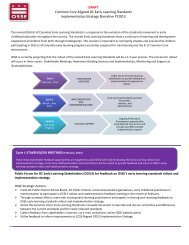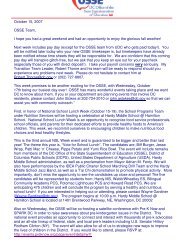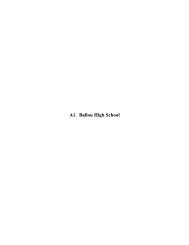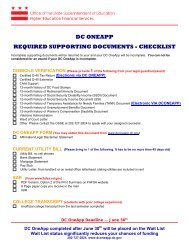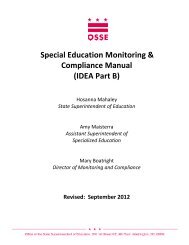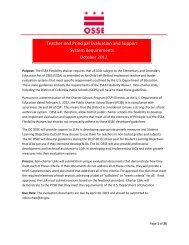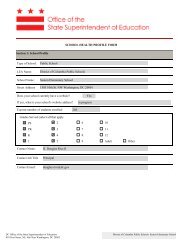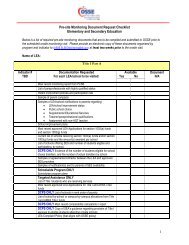Special Education (Non-Categorical) Standard 1 ... - osse
Special Education (Non-Categorical) Standard 1 ... - osse
Special Education (Non-Categorical) Standard 1 ... - osse
Create successful ePaper yourself
Turn your PDF publications into a flip-book with our unique Google optimized e-Paper software.
<strong>Special</strong> <strong>Education</strong> (<strong>Non</strong>-<strong>Categorical</strong>)<br />
Institutions and Organizations seeking State Approval for programs which prepare and result in the recommendation of candidates for licensure as<br />
teachers of <strong>Special</strong> <strong>Education</strong> shall be required to demonstrate that they meet the following program standards. The <strong>Standard</strong>s below are an adapted<br />
version of the 2003 standards of Council of Exception Children, for the Preparation of <strong>Special</strong> <strong>Education</strong> Teachers.<br />
<strong>Standard</strong> 1. Foundations<br />
Description<br />
<strong>Special</strong> educators understand the field as<br />
an evolving and changing discipline based<br />
on philosophies, evidence-based principles<br />
and theories, relevant laws and policies,<br />
diverse and historical points of view, and<br />
human issues that have historically<br />
influenced and continue to influence the<br />
field of special education and the education<br />
and treatment of individuals with<br />
exceptional needs both in school and<br />
society. <strong>Special</strong> educators understand how<br />
these influence professional practice,<br />
including assessment, instructional<br />
planning, implementation, and program<br />
evaluation. <strong>Special</strong> educators understand<br />
how issues of human diversity can impact<br />
families, cultures, and schools, and how<br />
these complex human issues can interact<br />
with issues in the delivery of special<br />
education services. They understand the<br />
relationships of organizations of special<br />
education to the organizations and<br />
functions of schools, school systems, and<br />
other agencies. <strong>Special</strong> educators use this<br />
knowledge as a ground upon which to<br />
construct their own personal<br />
understandings and philosophies of special<br />
education.<br />
Candidates:<br />
Indicators<br />
• Understand the field as an evolving and<br />
changing discipline based on philosophies,<br />
evidence-based principles and theories,<br />
relevant laws and policies, diverse and<br />
historical points of view, and human issues<br />
that have historically influenced and continue<br />
to influence the field of special education and<br />
the education and treatment of individuals<br />
with exceptional needs both in school and<br />
society.<br />
• understand how these influence professional<br />
practice, including assessment, instructional<br />
planning, implementation, and program<br />
evaluation.<br />
• understand how issues of human diversity<br />
can impact families, cultures, and schools,<br />
and how these complex human issues can<br />
interact with issues in the delivery of special<br />
education services.<br />
• understand the relationships of organizations<br />
of special education to the organizations and<br />
functions of schools, school systems, and<br />
other agencies. <strong>Special</strong> educators use this<br />
knowledge as a ground upon which to<br />
construct their own personal understandings<br />
and philosophies of special education.<br />
Map to Field Experience /<br />
Map to Curriculum and<br />
Course Experiences<br />
Assessment Strategies
<strong>Standard</strong> 2: Development and<br />
Characteristics of Learners<br />
Elements<br />
<strong>Special</strong> educators know and<br />
demonstrate respect for their<br />
students first as unique human<br />
beings. <strong>Special</strong> educators<br />
understand the similarities and<br />
differences in human<br />
development and the<br />
characteristics between and<br />
among individuals with and<br />
without exceptional learning<br />
needs (ELN) 1 . Moreover,<br />
special educators understand<br />
how exceptional conditions can<br />
interact with the domains of<br />
human development and they<br />
use this knowledge to respond to<br />
the varying abilities and<br />
behaviors of individual's with<br />
ELN. <strong>Special</strong> educators<br />
understand how the experiences<br />
of individuals with ELN can<br />
impact families, as well as the<br />
individual's ability to learn,<br />
interact socially, and live as<br />
fulfilled contributing members of<br />
the community.<br />
Candidates:<br />
Indicators<br />
• know and demonstrate respect<br />
for their students first as<br />
unique human beings.<br />
understand the similarities and<br />
differences in human<br />
development and the<br />
characteristics between and<br />
among individuals with and<br />
without exceptional learning<br />
needs (ELN).<br />
• understand how exceptional<br />
conditions can interact with the<br />
domains of human<br />
development and they use this<br />
knowledge to respond to the<br />
varying abilities and behaviors<br />
of individual's with ELN.<br />
• understand how the<br />
experiences of individuals with<br />
ELN can impact families, as<br />
well as the individual's ability<br />
to learn, interact socially, and<br />
live as fulfilled contributing<br />
Map to Field Experience / Map<br />
to Curriculum and Course<br />
Experiences<br />
Assessment Strategies
members of the community.<br />
<strong>Standard</strong> 3: Individual Learning<br />
Differences<br />
Elements<br />
<strong>Special</strong> educators understand the<br />
effects that an exceptional condition<br />
can have on an individual's learning<br />
in school and throughout life. <strong>Special</strong><br />
educators understand that the<br />
beliefs, traditions, and values across<br />
and within cultures can affect<br />
relationships among and between<br />
students, their families, and the<br />
school community. Moreover, special<br />
educators are active and<br />
resourceful in seeking to understand<br />
how primary language, culture, and<br />
familial backgrounds interact with<br />
the individual's exceptional condition<br />
to impact the individual's academic<br />
and social abilities, attitudes, values,<br />
interests, and career options. The<br />
understanding of these learning<br />
differences and their possible<br />
interactions provide the foundation<br />
upon which special educators<br />
individualize instruction to provide<br />
meaningful and challenging learning<br />
for individuals with ELN.<br />
Candidates :<br />
Indicators<br />
• understand the effects that an<br />
exceptional condition can have on<br />
an individual's learning in school<br />
and throughout life.<br />
• understand that the beliefs,<br />
traditions, and values across and<br />
within cultures can affect<br />
relationships among and between<br />
students, their families, and the<br />
school community.<br />
• are active and resourceful in<br />
seeking to understand how<br />
primary language, culture, and<br />
familial backgrounds interact with<br />
the individual's exceptional<br />
condition to impact the<br />
individual's academic and social<br />
abilities, attitudes, values,<br />
interests, and career options.<br />
be able to individualize instruction<br />
to provide meaningful and<br />
challenging learning for individuals<br />
with ELN.<br />
Map to Field Experience / Map<br />
to Curriculum and Course<br />
Experiences<br />
Assessment Strategies
<strong>Standard</strong> 4: Instructional Strategies<br />
Elements<br />
<strong>Special</strong> educators p<strong>osse</strong>s a<br />
repertoire of evidence-based<br />
instructional strategies to<br />
individualize instruction for<br />
individuals with ELN. <strong>Special</strong><br />
educators select, adapt, and use these<br />
instructional strategies to<br />
promote challenging learning results<br />
in general and special curricula and<br />
to appropriately modify learning<br />
environments for individuals with<br />
ELN. They enhance the learning of<br />
critical thinking, problem solving, and<br />
performance skills of individuals with<br />
ELN, and increase their selfawareness,<br />
self-management, selfcontrol,<br />
self-reliance, and selfesteem.<br />
Moreover, special<br />
educators emphasize the<br />
development, maintenance, and<br />
generalization of knowledge and<br />
skills across environments, settings,<br />
and the lifespan.<br />
Candidates:<br />
Indicators<br />
• p<strong>osse</strong>s a repertoire of evidencebased<br />
instructional strategies to<br />
individualize instruction for<br />
individuals with ELN<br />
• select, adapt, and use these<br />
instructional strategies to promote<br />
challenging learning results in<br />
general and special curricula and<br />
to appropriately modify learning<br />
environments for individuals with<br />
ELN.<br />
• enhance the learning of critical<br />
thinking, problem solving, and<br />
performance skills of individuals<br />
with ELN, and increase their selfawareness,<br />
self-management,<br />
self-control, self-reliance, and<br />
self-esteem.<br />
• emphasize the development,<br />
maintenance, and generalization<br />
of knowledge and skills across<br />
environments, settings, and the<br />
lifespan.<br />
Map to Field Experience / Map<br />
to Curriculum and Course<br />
Experiences<br />
Assessment Strategies
<strong>Standard</strong> 5: Learning Environments and<br />
Social Interactions<br />
Elements<br />
<strong>Special</strong> educators actively create<br />
learning environments for<br />
individuals with ELN that foster<br />
cultural understanding, safety<br />
and emotional well being,<br />
positive social interactions, and<br />
active engagement of individuals<br />
with ELN. In addition, special<br />
educators foster environments in<br />
which diversity is valued and<br />
individuals are taught to live<br />
harmoniously and productively in<br />
a culturally diverse world. <strong>Special</strong><br />
educators shape environments to<br />
encourage the independence,<br />
self-motivation, self-direction,<br />
personal empowerment, and selfadvocacy<br />
of individuals with ELN.<br />
<strong>Special</strong> educators help their<br />
general education colleagues<br />
integrate individuals with ELN in<br />
regular environments and<br />
engage them in meaningful<br />
learning activities and<br />
Candidates:<br />
Indicators<br />
• actively create learning<br />
environments for individuals<br />
with ELN that foster cultural<br />
understanding, safety and<br />
emotional well being, positive<br />
social interactions, and active<br />
engagement of individuals with<br />
ELN.<br />
• foster environments in which<br />
diversity is valued and<br />
individuals are taught to live<br />
harmoniously and productively<br />
in a culturally diverse world.<br />
• shape environments to<br />
encourage the independence,<br />
self-motivation, self-direction,<br />
personal empowerment, and<br />
self-advocacy of individuals<br />
with ELN.<br />
Map to Field Experience / Map<br />
to Curriculum and Course<br />
Experiences<br />
Assessment Strategies
interactions. <strong>Special</strong> educators<br />
use direct motivational and<br />
instructional interventions with<br />
individuals with ELN to teach<br />
them to respond effectively to<br />
current expectations. When<br />
necessary, special educators can<br />
safely intervene with individuals<br />
with ELN in crisis. <strong>Special</strong><br />
educators coordinate all these<br />
efforts and provide guidance and<br />
direction to para-educators and<br />
others, such as classroom<br />
volunteers and tutors.<br />
• help their general education<br />
colleagues integrate<br />
individuals with ELN in regular<br />
environments and engage<br />
them in meaningful learning<br />
activities and interactions.<br />
• use direct motivational and<br />
instructional interventions with<br />
individuals with ELN to teach<br />
them to respond effectively to<br />
current expectations.<br />
• safely intervene with<br />
individuals with ELN in crisis.<br />
<strong>Special</strong> educators coordinate<br />
all these efforts and provide<br />
guidance and direction to<br />
para-educators and others,<br />
such as classroom<br />
• volunteers and tutors.
<strong>Standard</strong> 6: Language<br />
Elements<br />
<strong>Special</strong> educators understand<br />
typical and atypical language<br />
development and the ways in<br />
which exceptional conditions can<br />
interact with an individual's<br />
experience with and use of<br />
language. <strong>Special</strong> educators use<br />
individualized strategies to<br />
enhance language development<br />
and teach communication skills<br />
to individuals with ELN. <strong>Special</strong><br />
educators are familiar with<br />
augmentative, alternative, and<br />
assistive technologies to support<br />
and enhance communication of<br />
individuals with exceptional<br />
needs. <strong>Special</strong> educators match<br />
their communication methods to<br />
an individual's language<br />
proficiency and cultural and<br />
linguistic differences. <strong>Special</strong><br />
educators provide effective<br />
language models, and they use<br />
communication strategies and<br />
Candidates:<br />
Indicators<br />
• understand typical and atypical<br />
language development and the<br />
ways in which exceptional<br />
conditions can interact with an<br />
individual's experience with<br />
and use of language.<br />
• use individualized strategies to<br />
enhance language<br />
development and teach<br />
communication skills to<br />
individuals with ELN.<br />
• are familiar with augmentative,<br />
alternative, and assistive<br />
technologies to support and<br />
enhance communication of<br />
individuals with exceptional<br />
needs.<br />
• match their communication<br />
methods to an individual's<br />
language proficiency and<br />
cultural and linguistic<br />
differences.<br />
Map to Field Experience / Map<br />
to Curriculum and Course<br />
Experiences<br />
Assessment Strategies
esources to facilitate<br />
understanding of subject matter<br />
for individuals with ELN whose<br />
primary language is not English.<br />
• provide effective language<br />
models, and they use<br />
communication strategies and<br />
resources to facilitate<br />
understanding of subject<br />
matter for individuals with ELN<br />
whose primary language is not<br />
English.<br />
<strong>Standard</strong> 7: Instructional Planning<br />
Elements<br />
Individualized decision-making<br />
and instruction is at the center of<br />
special education practice.<br />
<strong>Special</strong> educators develop longrange<br />
individualized instructional<br />
plans anchored in both general<br />
and special curricula. In addition,<br />
special educators systematically<br />
translate these individualized<br />
plans into carefully selected<br />
shorter-range goals and<br />
objectives taking into<br />
consideration an individual's<br />
abilities and needs, the learning<br />
environment, and a myriad of<br />
cultural and linguistic factors.<br />
Candidates:<br />
Indicators<br />
• recognize that Individualized<br />
decision-making and<br />
instruction is at the center of<br />
special education practice.<br />
• develop long-range<br />
individualized instructional<br />
plans anchored in both general<br />
and special curricula.<br />
systematically translate these<br />
individualized plans into carefully<br />
selected shorter-range goals and<br />
objectives taking into<br />
consideration an individual's<br />
abilities and needs, the learning<br />
environment, and<br />
Map to Field Experience / Map<br />
to Curriculum and Course<br />
Experiences<br />
Assessment Strategies
Individualized instructional plans<br />
emphasize explicit modeling and<br />
efficient guided practice to<br />
assure acquisition and fluency<br />
through maintenance and<br />
generalization. Understanding of<br />
these factors as well as the<br />
implications of an individual's<br />
exceptional condition, guides the<br />
special educator's selection,<br />
adaptation, and creation of<br />
materials, and the use of<br />
powerful instructional variables.<br />
Instructional plans are modified<br />
based on ongoing analysis of the<br />
individual's learning progress.<br />
Moreover, special educators<br />
facilitate this instructional<br />
planning in a collaborative<br />
context including the individuals<br />
with exceptionalities, families,<br />
professional colleagues, and<br />
personnel from other agencies as<br />
appropriate. <strong>Special</strong> educators<br />
also develop a variety of<br />
individualized transition plans,<br />
such as transitions from<br />
preschool to elementary school<br />
and from secondary settings to a<br />
variety of postsecondary work<br />
and learning contexts. <strong>Special</strong><br />
educators are comfortable using<br />
appropriate technologies to<br />
support instructional planning<br />
and individualized instruction.<br />
• a myriad of cultural and<br />
linguistic factors.<br />
• create Individualized<br />
instructional plans which<br />
emphasize explicit modeling<br />
and efficient guided practice to<br />
assure acquisition and fluency<br />
through maintenance and<br />
generalization.<br />
• understand that these factors<br />
as well as the implications of<br />
an individual's exceptional<br />
condition, guides the special<br />
educator's selection,<br />
adaptation, and creation of<br />
materials, and the use of<br />
powerful instructional<br />
variables.<br />
• modify Instructional plans<br />
based on ongoing analysis of<br />
the individual's learning<br />
progress.<br />
• facilitate this instructional<br />
planning in a collaborative<br />
context including the<br />
individuals with<br />
exceptionalities, families,<br />
professional colleagues, and<br />
personnel from other agencies<br />
as appropriate.<br />
• develop a variety of<br />
individualized transition plans,<br />
such as transitions from<br />
preschool to elementary<br />
school and from secondary<br />
settings to a variety of
postsecondary work and<br />
learning contexts.<br />
• are comfortable using<br />
appropriate technologies to<br />
support instructional planning<br />
and individualized instruction.<br />
<strong>Standard</strong> 8: Assessment<br />
Elements<br />
Assessment is integral to the<br />
decision-making and teaching of<br />
special educators and special<br />
educators use multiple types of<br />
assessment information for a<br />
variety of educational decisions.<br />
<strong>Special</strong> educators use the results<br />
of assessments to help identify<br />
exceptional learning needs and<br />
to develop and implement<br />
individualized instructional<br />
programs, as well as to adjust<br />
instruction in response to<br />
ongoing learning progress.<br />
<strong>Special</strong> educators understand<br />
the legal policies and ethical<br />
principles of measurement and<br />
assessment related to referral,<br />
Candidates:<br />
Indicators<br />
• use multiple types of<br />
assessment information for a<br />
variety of educational<br />
decisions.<br />
• use the results of assessments<br />
to help identify exceptional<br />
learning needs and to develop<br />
and implement individualized<br />
instructional programs, as well<br />
as to adjust instruction in<br />
response to ongoing learning<br />
progress.<br />
• understand the legal policies<br />
and ethical principles of<br />
measurement and<br />
assessment related to referral,<br />
eligibility,<br />
Map to Field Experience / Map<br />
to Curriculum and Course<br />
Experiences<br />
Assessment Strategies
eligibility, program planning,<br />
instruction, and placement for<br />
individuals with ELN, including<br />
those from culturally and<br />
linguistically diverse<br />
backgrounds. <strong>Special</strong> educators<br />
understand measurement theory<br />
and practices for addressing<br />
issues of validity, reliability,<br />
norms, bias, and interpretation of<br />
assessment results. In addition,<br />
special educators understand the<br />
appropriate use and limitations of<br />
various types of assessments.<br />
<strong>Special</strong> educators collaborate<br />
with families and other<br />
colleagues to assure non-biased,<br />
meaningful assessments and<br />
decision-making. <strong>Special</strong><br />
educators conduct formal and<br />
informal assessments of<br />
behavior, learning, achievement,<br />
and environments to design<br />
learning experiences that support<br />
the growth and development of<br />
individuals with ELN. <strong>Special</strong><br />
educators use assessment<br />
information to identify supports<br />
and adaptations required for<br />
individuals with ELN to access<br />
the general curriculum and to<br />
participate in school, system, and<br />
statewide assessment programs.<br />
<strong>Special</strong> educators regularly<br />
monitor the progress of<br />
individuals with ELN in general<br />
program planning, instruction,<br />
and placement for individuals<br />
with ELN, including those from<br />
culturally and linguistically<br />
diverse backgrounds.<br />
• understand measurement<br />
theory and practices for<br />
addressing issues of validity,<br />
reliability, norms, bias, and<br />
interpretation of assessment<br />
results.<br />
• special educators understand<br />
the appropriate use and<br />
limitations of various types of<br />
assessments.<br />
• collaborate with families and<br />
other colleagues to assure<br />
non-biased, meaningful<br />
assessments and decisionmaking.<br />
• conduct formal and informal<br />
assessments of behavior,<br />
learning, achievement, and<br />
environments to design<br />
learning experiences that<br />
support the growth and<br />
development of individuals<br />
with ELN.<br />
• use assessment information to<br />
identify supports and<br />
adaptations required for<br />
individuals with ELN to access<br />
the general curriculum and to<br />
participate in school, system,<br />
and statewide assessment<br />
programs.
and special curricula. <strong>Special</strong><br />
educators use appropriate<br />
technologies to support their<br />
assessments.<br />
• regularly monitor the progress<br />
of individuals with ELN in<br />
general and special curricula.<br />
• use appropriate technologies<br />
to support their assessments.<br />
<strong>Standard</strong> 9: Professional and Ethical<br />
Practice<br />
Elements<br />
<strong>Special</strong> educators are guided by<br />
the profession's ethical and<br />
professional practice standards.<br />
<strong>Special</strong> educators practice in<br />
multiple roles and complex<br />
situations across wide age and<br />
developmental ranges. Their<br />
practice requires ongoing<br />
attention to legal matters along<br />
with serious professional and<br />
ethical considerations. <strong>Special</strong><br />
educators engage in professional<br />
activities and participate in<br />
learning communities that benefit<br />
individuals with ELN, their<br />
families, colleagues, and their<br />
own professional growth. <strong>Special</strong><br />
educators view themselves as<br />
lifelong learners and regularly<br />
reflect on and adjust their<br />
Candidates:<br />
Indicators<br />
• are guided by the profession's<br />
ethical and professional<br />
practice standards.<br />
• practice in multiple roles and<br />
complex situations across<br />
wide age and developmental<br />
ranges.<br />
• give ongoing attention to legal<br />
matters along with serious<br />
professional and ethical<br />
considerations.<br />
• engage in professional<br />
activities and participate in<br />
learning communities that<br />
benefit individuals with ELN,<br />
their families, colleagues, and<br />
their own professional growth.<br />
Map to Field Experience / Map<br />
to Curriculum and Course<br />
Experiences<br />
Assessment Strategies
practice. <strong>Special</strong> educators are<br />
aware of how their own and<br />
others attitudes, behaviors, and<br />
ways of communicating can<br />
influence their practice. <strong>Special</strong><br />
educators understand that<br />
culture and language can interact<br />
with exceptionalities, and are<br />
sensitive to the many aspects of<br />
diversity of individuals with ELN<br />
and their families. <strong>Special</strong><br />
educators actively plan and<br />
engage in activities that foster<br />
their professional growth and<br />
keep them current with evidencebased<br />
best practices.<br />
<strong>Special</strong> educators know their<br />
own limits of practice and<br />
practice within them.<br />
• view themselves as lifelong<br />
learners and regularly reflect<br />
on and adjust their practice.<br />
• are aware of how their own<br />
and others attitudes,<br />
behaviors, and ways of<br />
communicating can influence<br />
their practice.<br />
• understand that culture and<br />
language can interact with<br />
exceptionalities, and are<br />
sensitive to the many aspects<br />
of diversity of individuals with<br />
ELN and their families.<br />
• actively plan and engage in<br />
activities that foster their<br />
professional growth and keep<br />
them current with evidencebased<br />
best practices.<br />
• know their own limits of<br />
practice and practice within<br />
them.
<strong>Standard</strong> 10: Collaboration<br />
Elements<br />
<strong>Special</strong> educators routinely and<br />
effectively collaborate with<br />
families, other educators, related<br />
service providers, and personnel<br />
from community agencies in<br />
culturally responsive ways. This<br />
collaboration assures that the<br />
needs of individuals with ELN are<br />
addressed throughout schooling.<br />
Moreover, special<br />
educators embrace their special<br />
role as advocate for individuals<br />
with ELN. <strong>Special</strong> educators<br />
promote and advocate the<br />
learning and well being of<br />
individuals with ELN across a<br />
wide range of settings and a<br />
range of different learning<br />
experiences. <strong>Special</strong> educators<br />
are viewed as specialists by a<br />
myriad of people who actively<br />
seek their collaboration to<br />
effectively include and teach<br />
individuals with ELN. <strong>Special</strong><br />
educators are a resource to their<br />
colleagues in understanding the<br />
laws and policies relevant to<br />
Individuals with ELN. <strong>Special</strong><br />
educators use collaboration to<br />
Candidates:<br />
Indicators<br />
• routinely and effectively<br />
collaborate with families, other<br />
educators, related service<br />
providers, and personnel from<br />
community agencies in<br />
culturally responsive ways.<br />
• assure that the needs of<br />
individuals with ELN are<br />
addressed throughout<br />
schooling.<br />
• embrace their special role as<br />
advocate for individuals with<br />
ELN.<br />
• promote and advocate the<br />
learning and well being of<br />
individuals with ELN across a<br />
wide range of settings and a<br />
range of different learning<br />
experiences.<br />
• are viewed as specialists by a<br />
myriad of people who actively<br />
seek their collaboration to<br />
effectively include and teach<br />
individuals with ELN.<br />
• are a resource to their<br />
Map to Field Experience / Map<br />
to Curriculum and Course<br />
Experiences<br />
Assessment Strategies
facilitate the successful<br />
transitions of individuals with<br />
ELN across settings and<br />
services.<br />
colleagues in understanding<br />
the laws and policies relevant<br />
to Individuals with ELN.<br />
• use collaboration to facilitate<br />
the successful transitions of<br />
individuals with ELN across<br />
settings and services.



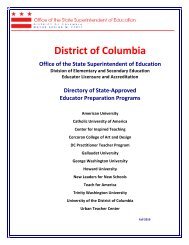
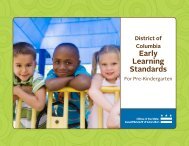
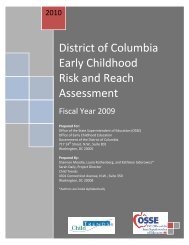
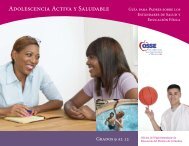
![DC Special Education Memorandum [PDF] - osse](https://img.yumpu.com/26875015/1/190x245/dc-special-education-memorandum-pdf-osse.jpg?quality=85)

